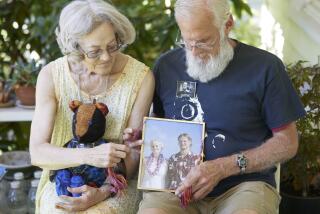Oregon Businessman Charged in ‘Portland Six’ Terrorist Case
- Share via
WASHINGTON — At a time when most of the federal terrorist cases are abruptly ending in plea bargains, prosecutors in Oregon on Monday expanded their investigation of the “Portland Six,” charging a local businessman with conspiracy to levy war against the United States.
Maher “Mike” Hawash, a former Intel software engineer who has been held for more than a month on a material witness warrant, was also charged with two counts of illegally attempting to provide material support to the Taliban and Al Qaeda terrorist organizations.
According to the criminal complaint, Hawash and the other suspects “decided after the Sept. 11 attacks to fight a jihad.”
Hawash’s arrest has galvanized many in the Pacific Northwest against alleged abuses by the Justice Department.
He is to be arraigned in federal court in Portland this morning. A rally is scheduled for outside the courthouse to protest Hawash’s arrest by FBI agents in March and to criticize the government for allegedly treating him harshly in order to gain cooperation in the ongoing investigation.
The case is scheduled to go to trial in October.
With Hawash added as a key defendant, the trial promises to be a showdown between prosecutors seeking to show how far some Americans were willing to go to retaliate against the Bush administration’s war on terrorism and defense lawyers who cite the case as an example of a reckless Justice Department intent on snaring innocent citizens.
In rallies in the Pacific Northwest, in Internet Web site postings and in pronouncements by the local ACLU, Hawash’s supporters said he has been unfairly targeted by overzealous law enforcement officers seeking to bolster their case against the other six defendants.
Hawash, 38, is a Palestinian who was born in Nablus, Jordan. He became a U.S. citizen in December 1990.
He lived with his family in the Portland suburb of Hillsboro, Ore., and worked as an engineer for Intel for nine years until August 2001. He later became a contract employee for the corporation.
Government officials said Hawash attended the Bilal Mosque in Beaverton, Ore.
The government contends the original six defendants practiced weapons training in a nearby gravel pit in the weeks after the Sept. 11 attacks, and that in October 2001 Hawash and five of the others journeyed to Central Asia, where they planned to meet with Taliban and Al Qaeda fighters and to battle U.S. troops in the region.
None of the men made it into Afghanistan, and all but one later returned to the Portland area, the government said.
As evidence against Hawash, prosecutors said he turned the title to his home over to his wife on Oct. 9, 2001, and signed a power-of-attorney document ceding control of his affairs to her.
He next purchased a parka, backpack, sunglasses, hiking socks, boots and gloves, all in preparation for his trip, the government said.
Prosecutors said Hawash flew from Seattle on Oct. 24, 2001, and traveled through Japan, Hong Kong and China using frequent-flier miles.
Evidence also showed that Hawash stayed in hotels with the other defendants while they attempted to make it into Afghanistan.
The government found a witness who recalled seeing the men in a hotel in China.
“The witness stated that over time he spoke with the men, that they generally stayed together, and that he frequently observed the group sitting, praying, talking, exercising, or practicing martial arts,” the complaint said.
After failing to gain entry to Afghanistan, the government said, Hawash returned to the U.S. on Nov. 18, 2001.
The FBI later used informants to infiltrate the group, prosecutors said, and learned that Hawash’s “only intention was to fight with the Taliban in Afghanistan.”
In addition, one of the defendants, Jeffrey Leon Battle, told informants that Hawash “left with us to go fight” and “that’s all he wanted to do.”
After the arrests of the six other defendants in October, a neighbor of Hawash’s called the FBI and said Hawash and his wife were friends of two of the defendants.
Lisa Hawash told FBI officials that her husband had gone to China to look for software business for Intel and that, while there, he telephoned her and said that he had “talked to someone about the possibility of importing fluorescent light bulbs to Nablus, Jordan, from China.”
Glenna Ryan, Lisa Hawash’s mother, told the FBI that Hawash had gone to China to evaluate an import-export business making hand-held microphones.
Government records showed that Hawash and his wife had an adjusted gross income in 2000 of nearly $360,000, most of it from his work at Intel.
Some Intel officials have been quick to support Hawash since his arrest.
Steven McGeady, Hawash’s supervisor at Intel, said “the only thing one can think of” for explaining the arrest was that Hawash had donated $10,000 in 2000 to the Global Relief Foundation, which since Sept. 11 has been reviewed for potential financial ties to terrorists.
David Fidanque, the executive director of the Oregon ACLU, said Hawash was first held as a material witness in the hope he would assist the prosecution.
He said prosecutors often used the material witness warrant procedure in order to “bring the full weight of the U.S. government down on individuals and their families to coerce them into doing whatever the government wants.”
More to Read
Sign up for Essential California
The most important California stories and recommendations in your inbox every morning.
You may occasionally receive promotional content from the Los Angeles Times.














